You may access the recordings of all past events through the links provided below. Events are presented in chronological order, from more recent to older. You may also want to check the upcoming digital events and all other events at events.fip.org.

You may access the recordings of all past events through the links provided below. Events are presented in chronological order, from more recent to older. You may also want to check the upcoming digital events and all other events at events.fip.org.
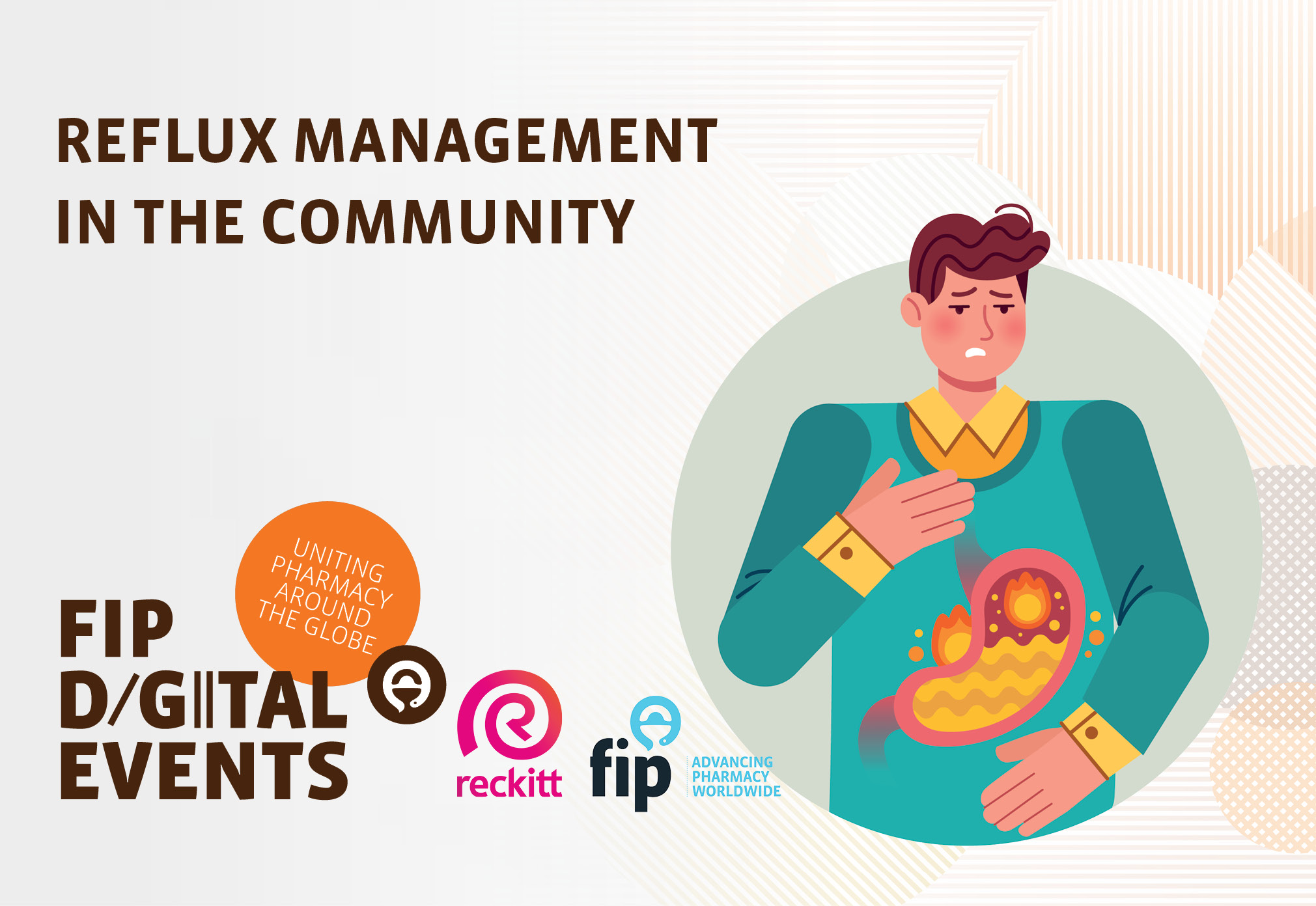
Pharmacists have an important role in supporting the management of minor ailments in the community and promoting informed and responsible self-care. Gastroesophageal reflux is a common reason for consultations to community pharmacists, and symptoms associated with reflux can often be managed through non-prescription medicines. Pharmacists can assess and provide advice on both the pharmacological and non-pharmacological options that patients might follow, check for possible interactions with medication that patients might be taking, and provide education for improved self-care.
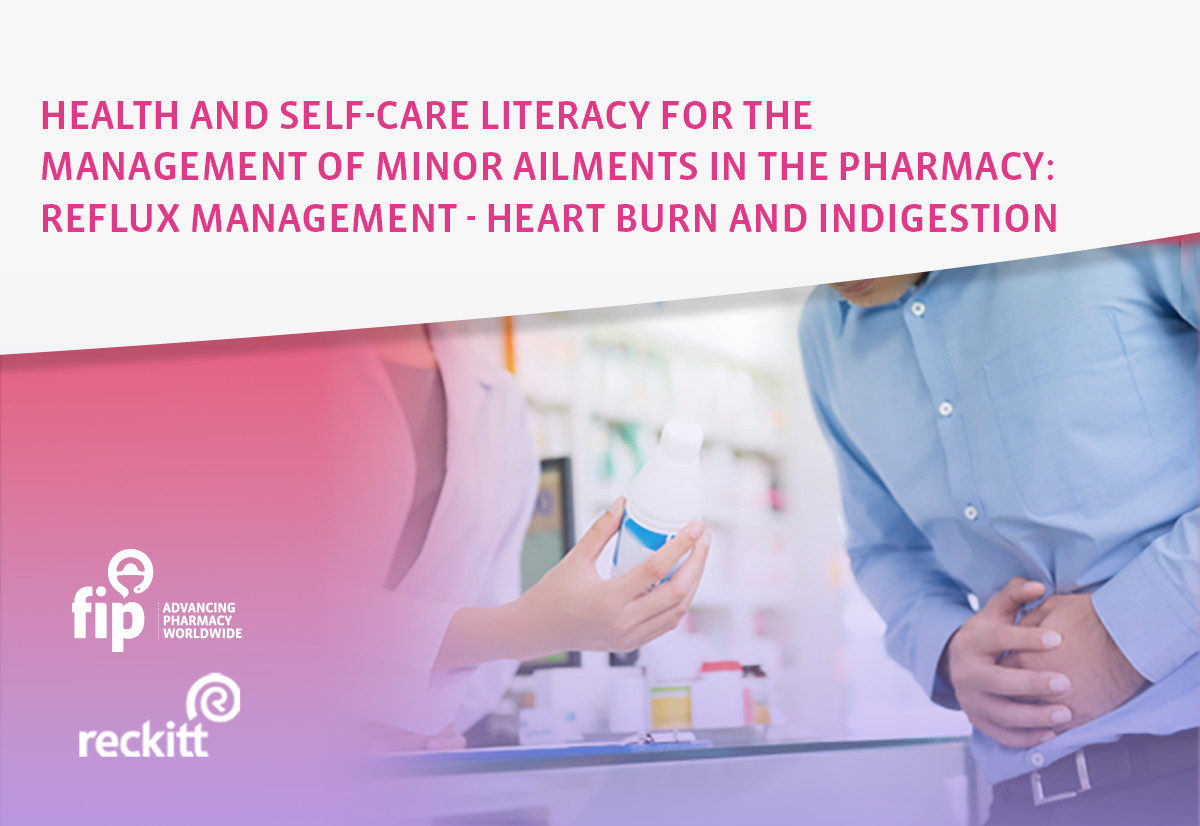
Empowering patient self-care improves health outcomes and reduces the burden of diseases. Improving health and self-care literacy is key to empowering pharmacy-based self-care. This is especially important when it comes to the management of minor ailments through pharmacy. Consisting of a series of five events focusing on common health issues, this new FIP digital programme aims to examine how pharmacists can be enabled to improve health and self-care literacy. Approaches for each of the five areas of minor ailments will be discussed including embedding health and self-care literacy into education and training, developing self-diagnosis and self-medication protocols, widening access to patient information, and improving referral strategies.
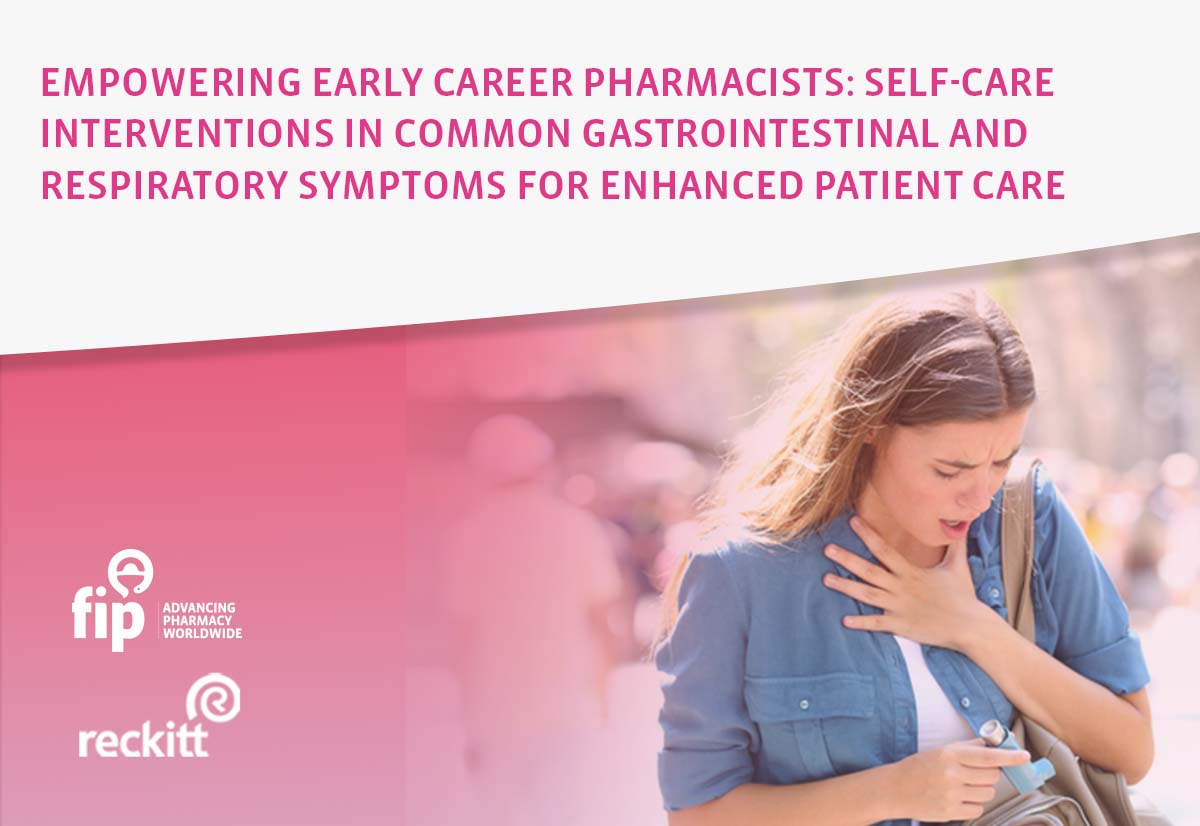
According to WHO, individuals spend less than 1h a year with a health worker versus over 8700h a year in self-care. Self-care interventions promote individuals’ active participation in their own healthcare. To support them on this journey, pharmacists are equipped with knowledge and skills to better their self-determination, self-efficacy, autonomy, and engagement in health.
This digital event is designed as a collection of three CPB Bites to equip early career pharmacists with essential self-care knowledge in the context of reflux management, irritable bowel syndrome, and respiratory symptoms (including sore throat). Issues around gender biases in patient interactions and during treatment will be highlighted.

Several factors can influence digestive wellness and gut wellness, including stress, nutrition or medication. Disruptions to the microbiota homeostasis can lead to gastrointestinal symptoms and have an impact in immunity. This event will discuss dysbiosis and the role that pharmacists can have in improving gut wellness and immunity.
By the end of the session participants should be able to:
• Understand dysbiosis and gut wellness
• Identify tips to manage abdominal pain
• Understand the role of diet in immunologic modulation
• Understand the use of probiotics for gut wellness
Moderator:
- Bidhata Khatri, FIP Health and Medicines Information Section (HaMIS) Secretary FIP, India
Panelists:
- Saman Khalesi, Senior Lecturer and Discipline Lead – Nutrition Central Queensland University (CQUniversity); Postdoctoral Fellow of the National Heart Foundation of Australia, Australia
- Ana Faria, Assistant Professor Nova Medical School - Universidade Nova de Lisboa, Portugal
- Ender Pehlivanoglu, Professor of Pediatric Gastroeneterology&Nutrition Istanbul Kent University, Turkey
- Metehan Özen, Pediatric Infectious Disease Specialist Acibadem University, School of Medicine, Turkey

Several factors can influence digestive wellness and gut wellness, including stress, nutrition or medication. Disruptions to the microbiota homeostasis can lead to gastrointestinal symptoms and have an impact in immunity. This event will discuss dysbiosis and the role that pharmacists can have in improving gut wellness and immunity.
By the end of the session participants should be able to:
• Understand dysbiosis and gut wellness
• Identify tips to manage abdominal pain
• Understand the role of diet in immunologic modulation
• Understand the use of probiotics for gut wellness
Moderator:
- Bidhata Khatri, FIP Health and Medicines Information Section (HaMIS) Secretary FIP, India
Panelists:
- Saman Khalesi, Senior Lecturer and Discipline Lead – Nutrition Central Queensland University (CQUniversity); Postdoctoral Fellow of the National Heart Foundation of Australia, Australia
- Ana Faria, Assistant Professor Nova Medical School - Universidade Nova de Lisboa, Portugal
- Ender Pehlivanoglu, Professor of Pediatric Gastroeneterology&Nutrition Istanbul Kent University, Turkey
- Metehan Özen, Pediatric Infectious Disease Specialist Acibadem University, School of Medicine, Turkey

Several factors can influence digestive wellness and gut wellness, including stress, nutrition or medication. Disruptions to the microbiota homeostasis can lead to gastrointestinal symptoms and have an impact in immunity. This event will discuss dysbiosis and the role that pharmacists can have in improving gut wellness and immunity.
By the end of the session participants should be able to:
• Understand dysbiosis and gut wellness
• Identify tips to manage abdominal pain
• Understand the role of diet in immunologic modulation
• Understand the use of probiotics for gut wellness
Moderator:
- Bidhata Khatri, FIP Health and Medicines Information Section (HaMIS) Secretary FIP, India
Panelists:
- Saman Khalesi, Senior Lecturer and Discipline Lead – Nutrition Central Queensland University (CQUniversity); Postdoctoral Fellow of the National Heart Foundation of Australia, Australia
- Ana Faria, Assistant Professor Nova Medical School - Universidade Nova de Lisboa, Portugal
- Ender Pehlivanoglu, Professor of Pediatric Gastroeneterology&Nutrition Istanbul Kent University, Turkey
- Metehan Özen, Pediatric Infectious Disease Specialist Acibadem University, School of Medicine, Turkey

Irritable bowel syndrome (IBS) is a common chronic gastrointestinal disorder that affects people of all ages. Pharmacists can play an important role in symptom management, referral to other healthcare professionals and provision of advice to improve quality of life. This event will provide an overview of the main roles pharmacists can have in supporting people living with IBS, from a community pharmacy perspective.
By the end of the session participants should be able to:
• Discuss the role of community pharmacists around IBS
• Understand the difference in symptoms between abdominal cramping pain and IBS
• Identify red flag symptoms for referral of IBS patients

This first event in the FIP 2022 series 'Food for thought: Pharmacists' role in health nutrition' aims to describe the basics of nutrition for pharmacists, and the role of pharmacists in providing nutrition services for better health outcomes, expanding from the 2021 FIP report "Nutrition and weight management services: A toolkit for pharmacists".
Moderator:
- Jaime Acosta, Community Pharmacist, Farmacia Acosta, Spain
Panellists:
- Joanna Harnett, Senior Lecturer, Sydney Pharmacy School, Australia
- Rúben Viegas, Practice Development Projects Coordinator, FIP, Portugal
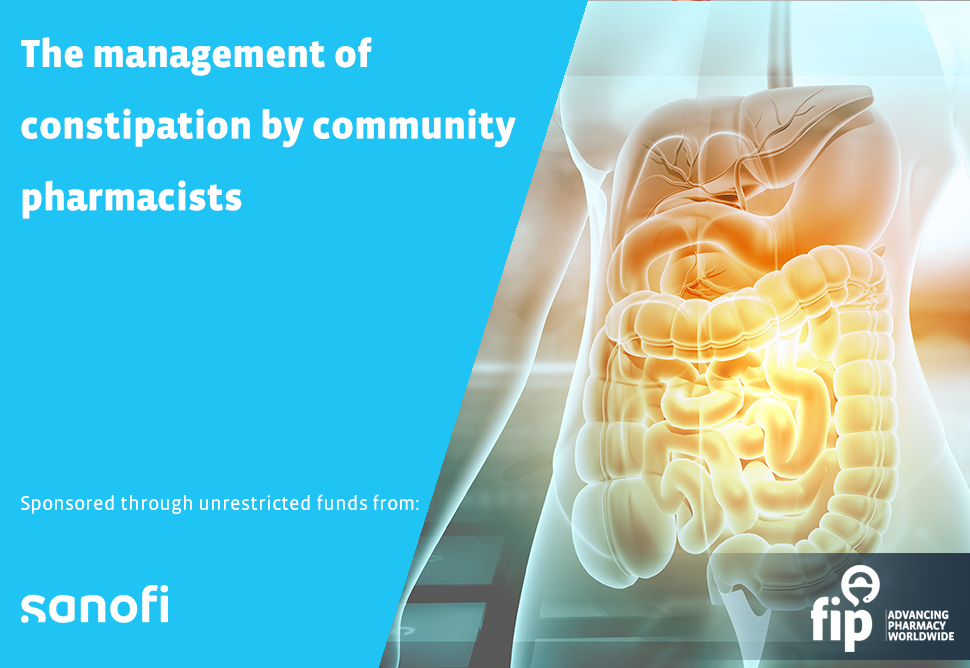
Constipation is a common symptom pharmacists encounter in daily practice. It is often a self-limiting symptom that can be adequately managed in the community through the use of non-prescription medicines, as well as dietary and lifestyle measures. This event will explore how community pharmacists may support the management of constipation and empower individuals for optimal self-care.
By the end of the session participants should be able to:
• Understand the role of pharmacists in managing constipation in the community
• Understand the influence of fibre, exercise, and fluids in constipation
• Explore the complications of constipation medicines, especially in older adults
Moderator:
- Marwan Akel, FIP Projects Manager - Workforce development, evidence & impact, Lebanon
Panellists:
- Safwan Jihan, Assistant Dean, Lebanese International University / School of Pharmacy, Lebanon
- Madisch, Ahmed, Senior Consultant and Head, Center of Gastroenterology Bethanien, Germany
- João Rafael Gonçalves, Community pharmacist, Portugal
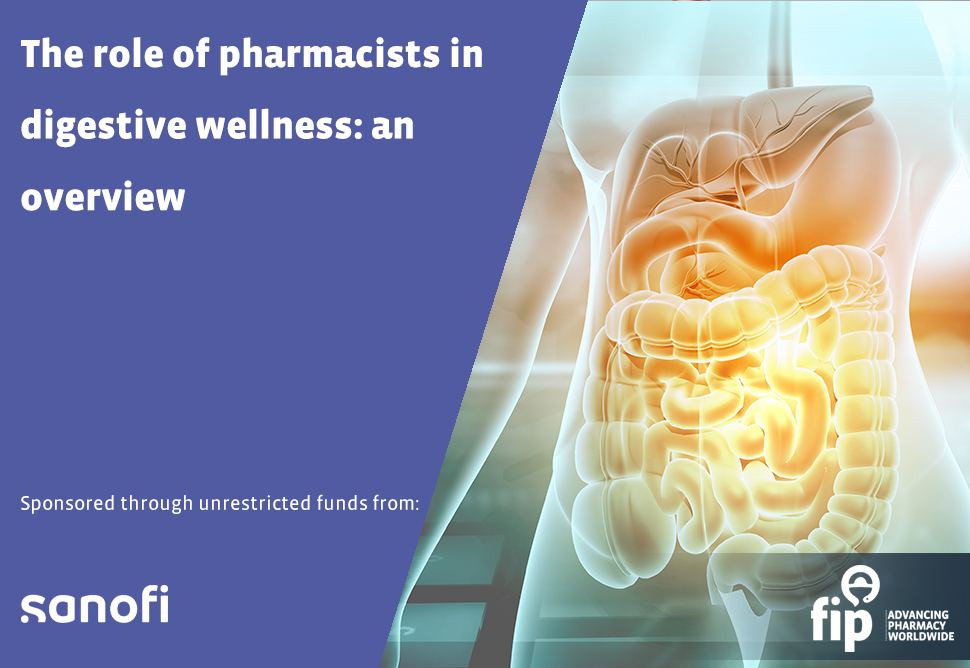
Gastrointestinal health and digestive wellness can be influenced by several lifestyle factors, including diet and stress, and using certain types of medicines. It is important for pharmacists to consider these factors when interacting with patients who present with such symptoms. Different non-prescription medicines are available to treat symptoms related to GI complaints and digestive wellness, rendering pharmacies key access points for trusted advice and access to self-care products which can provide relief and care to affected individuals. This event marks the World Digestive Wellness Day (29 May).
By the end of the session participants should be able to:
• Understand the role of pharmacists in providing advice on digestive wellness
• Understand the relationship between gut wellness and immunity
• Identify practical ways to support better digestive wellness in the community

Gastrointestinal symptoms have an impact on the health and wellbeing of individuals that can be debilitating, however, the majority of people can be supported by the pharmacy team to self-care and effectively manage their symptoms.
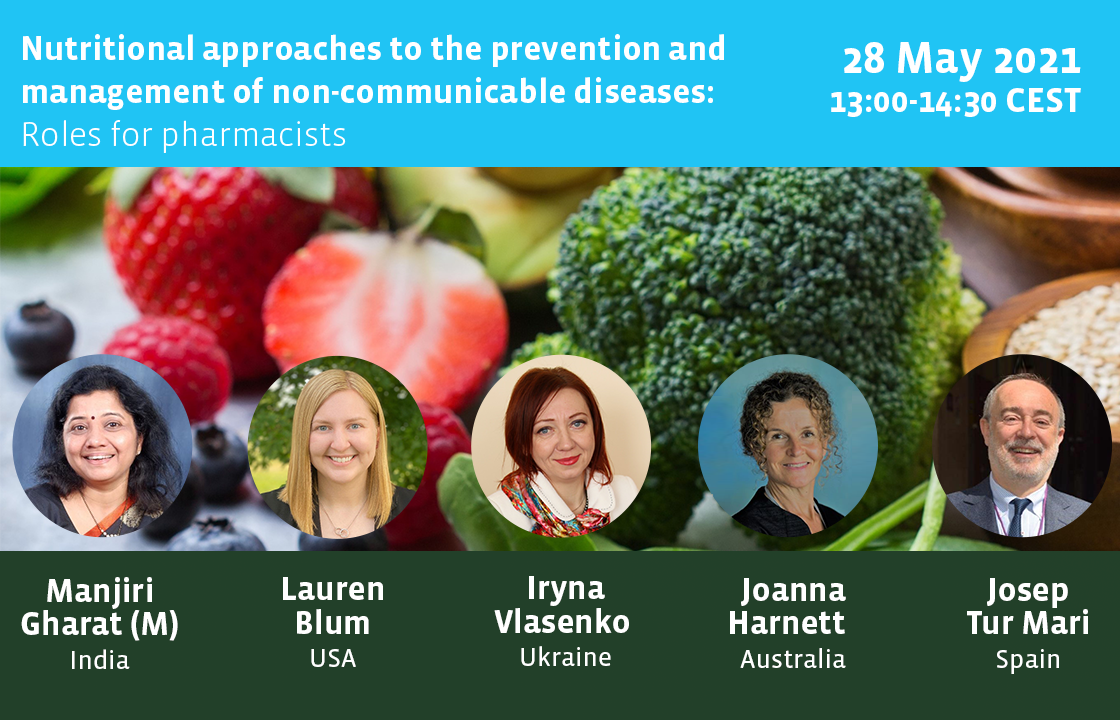
This webinar will focus on the role of nutrition in the prevention and management of non-communicable diseases, and the role that pharmacists can play to support healthy nutrition choices for different population groups. We plan to invite a range of expert speakers to address important aspects such as the role of community of pharmacists in diabetes prevention, screening, referral and management, the role of dietary supplements in disease management and one example of a community pharmacy nutrition service. In addition, we will also present selected aspects from the FIP handbook on nutrition and weight management for pharmacists, to be launched that day.